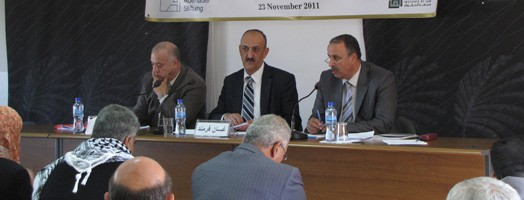The New Income Tax Law: Overburden or Urgent Necessity
With support from the Konrad Adenauer Stiftung, the Institute of Law (IoL) at Birzeit University organised on 23 November 2011 a legal encounter on the New Income Tax Law: Overburden or Urgent Necessity. The presentation was delivered by Mr. Hamzeh Zalloum, Director General of the Income Tax Directorate, and Dr. Sa’id Haifa’, Professor of Economics at Birzeit University and member on several Palestinian institutions.
In his opening remarks, Dr. Ghassan Faramand, IoL Director, highlighted significance of the legal encounter as it would cast light on the newly issued Decree Law Concerning Income Tax No. (8) of 2011. According to Dr. Faramand, income tax is crucial for supporting the Public Treasury, promoting the Palestinian national economy and bringing about social justice.
Mr. Hamzeh Zalloum expressed his thanks to the IoL for inviting him to this legal encounter. Mr. Zalloum confirmed that the encounter was well timed as the Decree Law of Income Tax No. (8) of 2011 had entered into force just few days earlier. Like any other regulation, the Decree Law has been developed in line with applicable economic, accounting and legal policies to ensure its general and specific targets are duly met.. In tandem with other tax legislation, however, this Income Tax Decree Law is collection-oriented.
Its primary goal is to increase revenues of the Palestinian Authority (PA). Mr. Zalloum emphasised that the Decree Law has been issued to find a solution to legal problems the Income Tax Directorate faces, especially with the insurance and banking sectors. A joint committee, comprising representatives of the Legal Department and Income Tax Directorate, was established to examine and develop the draft Income Tax Decree Law. To this effect, the committee contacted all relevant stakeholders, including the Palestinian Association of Certified Public Accounts, Palestine Capital Market Authority, etc. The Decree Law distributes the tax burden among taxpayers. In comparison to the old Income Tax Law No. (17) of 2004, Mr. Zalloum addressed major amendments and new provisions under the Income Tax Decree Law. Whereas new definitions were introduced, some provisions were repealed.
Dr. Sa’id Haifa’ commended the IoL for the initiative it had taken to organise this legal encounter. Starting his presentation with “Yes to pay tax”, Dr. Haifa’ stated that income tax is a prominent national duty that each taxpayer should fulfil. As a source of revenue for the Public Treasury, income tax provides an economic policy tool to achieve a number of targets, including economic growth, creating employment opportunities, reducing unemployment, maintaining prices, ensuring fair allocation of income across the society and providing protection to vulnerable and marginalised groups. Dr. Haifa’ then explained differences between the Decree Law of Income Tax No. (8) of 2011 and the repealed Income Tax Law No. (17) of 2004. In this context, he questioned the philosophy behind this newly issued regulation as well as the needs to expand the tax base and increase tax burdens on certain sectors, such as agriculture.
Dr. Haifa’ asserted that by enacting the Decree Law of Income Tax No. (8) of 2011, the PA seeks to increase revenues and reduce reliance on external aid. If this is the case, this goal can be attained by promoting domestic investments, attracting foreign investments and consolidating the rule of law. As it poses further burdens on Palestinian citizens who already suffer from harsh economic conditions, Dr. Haifa’ concluded that this regulation should have not been promulgated.
In the ensuing discussion, the audience raised questions and made significant contributions, which generally confirmed that the Decree Law of Income Tax No. (8) of 2011 posed a burden on Palestinian citizens. It did not express an urgent necessity.











